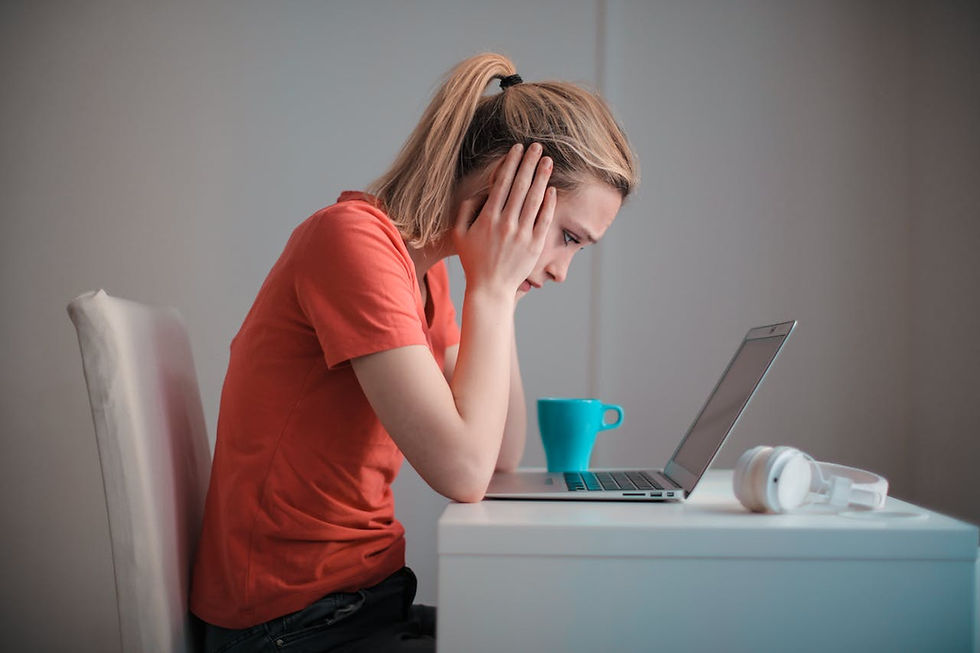How Journaling Can Help Your Anxiety
- Grace Dowd
- Dec 1, 2022
- 3 min read
Anxiety is one of the most common experiences among people. Whether we hear someone speaking about “feeling anxious” or having an “anxiety disorder,” they may all be referencing similar experiences. What you may be experiencing may feel alarming and overwhelming, though it can be a completely natural response to stressful situations.
What is Anxiety?
Maybe you have been coping with anxiety for a long time. Sometimes, our body remains in this anxious state even after the stress or threat is no longer present in our lives. Learning how to regulate this anxious energy is a key part in soothing anxious thoughts and coping with the physical symptoms of anxiety.

Common symptoms of anxiety may include:
Feeling restless, nervous, tense
Persistent worrisome thoughts
Increased heart rate
Racing thoughts
Change in eating or sleeping habits
Fatigue
Difficulty concentrating
Irritability
Rapid breathing
Digestive problems
Excessive sweating
You likely are very familiar with some or all of these symptoms. They can be very uncomfortable to deal with in every day life. Finding tools to utilize, like journaling, can be a great first step in coping with your anxiety.

How can journaling help my anxiety?
It might seem like an odd concept to journal about the very thing that you are wanting to get rid of or ignore. It would be much easier if we could simply pretend our anxiety does not exist, but sometimes this is the very thing that makes our anxiety that much worse! It’s important to hold this in mind when approaching your anxious thoughts - distraction can be helpful in some circumstances, but if you notice that it is making your anxiety worse, try utilizing a different skill, like journaling.
Being able to place all of your thoughts (anxious or not) on paper can be a helpful way to make sense of what is going on in your mind. Have you ever had the experience of realizing how silly something felt after saying it out loud? Journaling some of your anxious thoughts can be similar. Writing down your thoughts can be useful in making sense of them. It can help reduce your stress, identify triggers for your anxiety, improve your overall mood, and begin the process of challenging your anxious thoughts.
How to start:
Starting your journaling process may be a challenge, and we hope that these tips will help. Start by identifying what you will utilize as your journal or thought diary. Maybe you already have a journal that you write in, or you want to purchase a new one specifically for tracking your anxious thoughts and feelings, and any patterns that you notice.
Setting aside some time each day can be a great second step. Even identifying 5 to 15 minutes each day to write down any anxiety that came up throughout that day. Whether this be in the morning or at the end of the day will be contingent upon each person and their lifestyle. If you have a flexible schedule, carrying the journal with you to write things out when you are feeling more anxious can be another great option.
Don’t force this process. It may take some time to get used to, as any new habit does. If time passes and it does not feel like a helpful habit for you, that is okay. Not everyone finds journaling an enjoyable process, but celebrate yourself for trying something new for your mental health.
You may also find it helpful to use journal prompts. There are many anxiety journals with prompts already written in, or you can simply Google “journal prompts for anxiety.”
As you journal about your anxious thoughts, make sure to document what is happening around you when you are feeling anxious: where are you, who are you with, what are you doing. All of these factors can help identify if there are any specific triggers to your anxiety.
You are not alone.
Of course journaling is a great tool to utilize, but know that there is always support. If you are struggling with Anxiety, know that you are not alone and reach out to one of our clinicians today.



